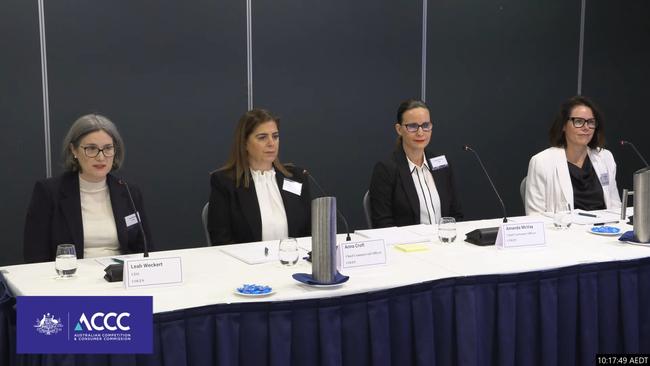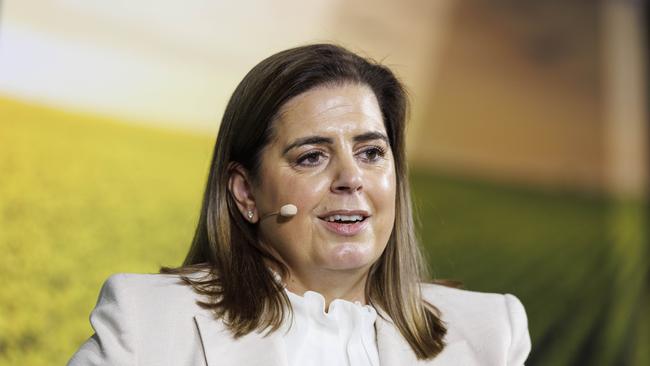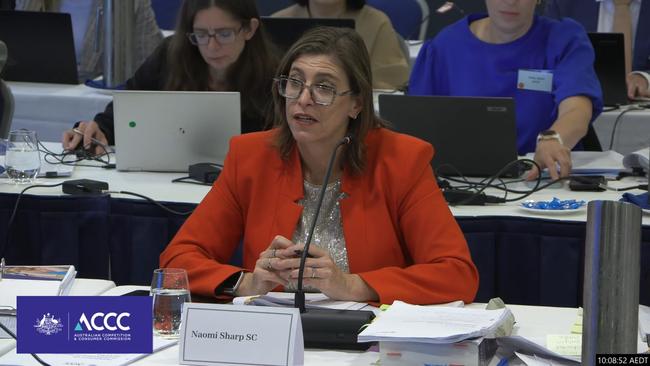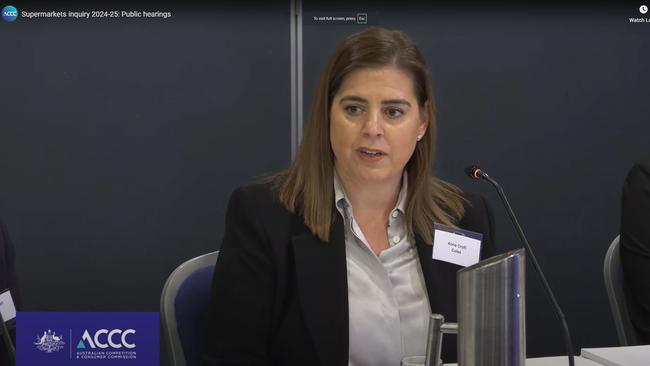Coles executives clash with ACCC inquiry over farmer ‘commitments’
The difference between a ‘commitment’ to buy fresh produce from farmers and a ‘legally binding’ deal was a source of fireworks at the final day of the ACCC public hearing into supermarkets.

Business
Don't miss out on the headlines from Business. Followed categories will be added to My News.
The final day of public hearings into the supermarkets saw some fireworks when counsel assisting the inquiry Naomi Sharp, SC, clashed with Coles commercial boss Anna Croft over whether a “commitment” to buy fresh food from farmers was legally binding, with the Coles lawyer present at the hearing forced to intervene to fend off the line of questioning.
The Australian Competition & Consumer Commission deputy chair Mick Keogh, who is chairing the public hearing, was also dragged into the verbal stoush pressing Ms Croft to answer the question.
A number of times Ms Sharp cut off Ms Croft, requesting her to answer the basic question if a commitment to buy goods was legally binding or not.
However, after a number of interventions by Michael Borsky, KC, who is representing Coles, it was decided the line of questioning over commitments and legally binding deals with farmers would be held back until after lunch to give time for Coles and its lawyers to discuss the issue further behind closed doors.

Later, ACCC chair Gina Cass-Gottlieb made an appearance at the hearing to ask Ms Croft about order commitments made to farmers and growers.
Supermarkets failing to buy set or forecast quantities of perishable fresh produce has long been a bugbear for farmer suppliers and which have made these complaints to the ACCC and regulators.
Before the lunch break on Friday, Ms Sharp pushed Ms Croft on how Coles orders its fresh fruit and vegetables from farmers and in particular the volumes it ordered from its suppliers. Of particular interest to Ms Sharp, who has led the questioning at the supermarket inquiry hearings over the last few weeks, was the meaning of Coles making a “commitment” to buy certain volumes of fresh produce and if this commitment was also legally binding.
Ms Croft had earlier used the word “commitment” to describe the deal between Coles and growers.
“I note you are using the word commitment, but you don’t mean legally binding do you?” Ms Sharp asked.
Ms Croft attempted to explain how Coles ordered volumes and commits to buy these volumes but was pushed further by Ms Sharp that “commitment” actually meant “non binding”.

Another attempt to answer the question saw intervention from Mr Keogh.
“I don’t think you have answered the question,” he said. “The question was quite specific about the nature of the contractual obligation.”
“You didn’t answer the question whether it is a legally binding contractual obligation on Coles.”
As Ms Croft began to respond – talking about the chain’s relationship with growers – she was interrupted by Mr Keogh. “No, no sorry, the question was whether that commitment was contractually legally binding on Coles.”
Coles boss Leah Weckert then joined in to fend off the line of questions, responding that Coles had shared with the hearing what it was able to and “we probably don’t have more than we can add”.
It was then that Coles lawyer’ Mr Borsky objected to the line of questioning from Ms Sharp and Mr Keogh.
“If I may respectfully add, the commission (ACCC) has the contractual documents, neither Ms Croft nor Ms Weckert is a lawyer, there are a number of lawyers in this room who may have a variety of views in answer to your question, with the greatest of respect,” he said.
“The witness has done her best to answer the question, I’m not sure it can be taken any further.”
Ms Sharp pushed the line of questioning further, cutting off Ms Croft as she tried again to answer the question on legally binding terms, saying “can you please just answer my question”.

“Please just answer my question Ms Croft. Ms Croft there is nothing unclear about my question. I simply wish to establish with you that when you say the word commitment you are not for one moment suggesting that Coles is contractually bound to take a particular volume from a supplier. That is right isn’t it?
“Why won’t you answer my question Ms Croft?”
Over the lunch break Coles was seeking legal advice as to how to respond to the questions regarding commitments and legally binding agreements.
Later Ms Croft confirmed that Coles in a given week would place 20,000 purchase orders with suppliers, including farmers, and that only a small portion of those orders would see a new negotiation on price due to product availability.
Coles boss Leah Weckert was asked by Ms Sharp if she believed Coles had a strong negotiating position or bargaining power with farmer suppliers given the retailer’s size and the perishable nature of fresh fruit and vegetables.
Ms Weckert said this was the case with “some” farmers “in some cases”.
Later the public hearing was taken into a private session to discuss commercially confidential issues.
The ACCC is expected to hand its final report of its supermarkets inquiry to federal Treasurer Jim Chalmers in February.
More Coverage
Originally published as Coles executives clash with ACCC inquiry over farmer ‘commitments’





